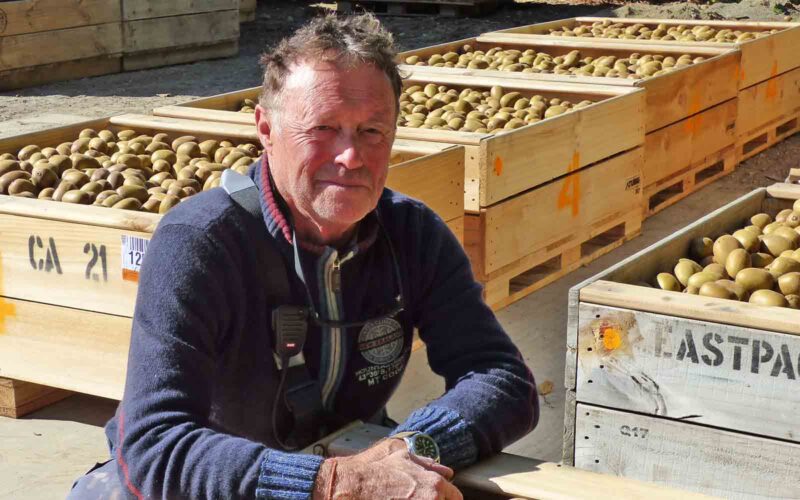Long-time Opotiki kiwifruit grower and contractor Brett Wooten is finding this season more challenging than ever over harvest, and said he can’t wait for migrant labour to return to the eastern Bay of Plenty.
Wooten grows 24ha of kiwifruit spread between Green and SunGold, and also runs a large contracting business to harvest and manage kiwifruit orchards in the district.
Like most growers he would prefer to employ locals. But he has clearly become frustrated at this season’s labour challenges.
He needs about 150 staff on the ground this season, but admits some days he is short as much as 40%. Despite Opotiki having over 800 jobseeker beneficiaries, he will often have to try 30 locals, just to get 8-10 to turn up for a shift.
“And sometimes I may only get four or five out of that. I admit, I will worship the ground backpackers and RSE workers walk on should they return next year,” Wooten said.
“I have all but given up (on locals), they are too stoned, too drunk – gangs and drugs are the biggest issues here.”
He is compelled to separate some work teams on grounds of their respective gang affiliations, lest scraps break out in clients’ orchards during shifts.
However, he also said he has some extremely loyal hardworking local employees who he deeply respects that have been working for him over 15 years.
Barbara McLennan, workforce management for development agency Toi EDA maintains kiwifruit has been slow off the mark when it has come to offering permanent, well-paid jobs to locals.
“In 2015, about one in five jobs was full-time and that is changing. But the payment of a living wage has been one of the most important things to come out since covid limited RSE workers here too, before this just was not happening across the industry,” McLennan said.
She said the ability to pay more full-time roles, aided by the arrival of the district’s mussel plant has helped many iwi who may be supporting extended whanau in their household.
“And we have seen kiwifruit step up offering far more flexible hours and being quite innovative, offering transport to jobs, meals at the start of shifts and sites for people in camper vans to stay,” she said.
Wooten has long taken the view that the “bottom 10%” of the community need lifting up, leveraging off the opportunities the likes of him can offer. He was part of a community of growers donating 1-2c a tray to a fund that accumulated almost $100,000.
However, he said conflicting objectives among contributors meant it became spread too widely, and he felt compelled to resign.
Even as more orchards are developed further down the coast, Wooten is circumspect about how far future expansion can go, given labour constraints.
“I really think once you get down toward Te Kaha, we are going to see a mini-Tonga there, with RSE workers having to do the job,” he said.
Eastpack and Seeka are the two main post-harvest processors in the district.
Eastpack chief executive Hamish Simson said he sees a disjoint between the training skills school-leavers are receiving in the district and the district’s job needs.
He accepts the sector has some responsibility to engage with locals and points to school holiday employment as a successful example.
“The job opportunities are there, but everyone’s challenge is how do you reduce unemployment in a town where it has always been high?”
Hamish Simson
Eastp
“For many of these kids we are their first boss and workplace exposure, we spend a lot of time inducting them because we want them to come back,” Simson said.
Eastpack also works with the Ministry of Social Development (MSD) to engage beneficiaries.
“Does this help get some off unemployment? Yes, but it’s not 100% successful. The challenge is not enough people are work-ready, to stick with something day in, day out,” he said.
Seeka has recently purchased Opotiki packhouse operator OPAC. The company is also developing 65ha of orchards up the coast at Te Kaha with iwi.
CEO Michael Franks said the company has a history of working with iwi and MSD in other regions, and was likely to build on that in Opotiki.
This includes limited period on-boarding programmes giving potential employees an insight to the business.
An active cadet programme could also be replicated locally, with 13 already on a five-year programme to Level 4 industry training.
But like Simson, Franks is adamant RSE workers and backpackers will remain a key part of the labour supply into the future.
Simson said Opotiki is and always will be on the edge of the industry in terms of accessing labour supply, given the increased plantings, distance, small population base and inherent social issues.
“The job opportunities are there, but everyone’s challenge is how do you reduce unemployment in a town where it has always been high?” he asked.
“Guys like Brett really are at ground zero right now, especially after the year we have had where labour is at a crisis point.”






